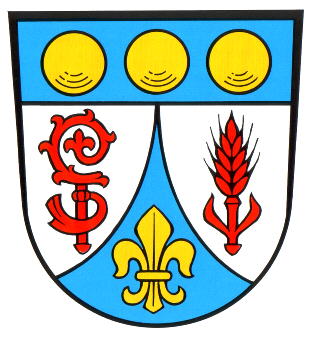Kettershausen: Difference between revisions
Knorrepoes (talk | contribs) m (Text replacement - "{| class="wikitable"↵|+Official blazon↵|-↵|'''German'''↵| ↵|-↵|'''English''' ↵| {{blazon wanted}}↵|}" to "{| class="wikitable" |+Official blazon |- |'''German''' | blazon wanted |- |'''English''' | blazon wanted |}") |
Knorrepoes (talk | contribs) m (Text replacement - "''' :" to "''':") |
||
| (5 intermediate revisions by the same user not shown) | |||
| Line 1: | Line 1: | ||
{| class="wikitable" | |||
|- style="vertical-align:top;" | |||
|[[File:kettersh.jpg|center|350 px|alt=Wappen von {{PAGENAME}}/Arms (crest) of {{PAGENAME}}]] | |||
| | |||
<center>''' {{uc:{{PAGENAME}}}} '''</center><br> | |||
'''Country''': Germany [[File:germany.jpg|60 px|right]]<br><br><br><br> | |||
'''State''': [[Bayern]][[File:Bayern.jpg|60 px|right]]<br><br><br><br> | |||
'''District (Kreis)''': [[Unterallgäu]][[File:unterall.kreis.jpg|60 px|right]]<br>(until 1973 Illertissen)<br><br><br> | |||
'''Additions''':<br> | |||
* 1973 Gangwalden | |||
* 1973 Mohrenhausen | |||
* 1973 Tafertshofen | |||
* 1973 Zaiertshofen | |||
* 1978 Bebenhausen | |||
{{#display_map:48.1823,10.2590|width=250|height=250|zoom=7}} | |||
|} | |||
{| class="wikitable" | {| class="wikitable" | ||
| Line 13: | Line 21: | ||
|- | |- | ||
|'''German''' | |'''German''' | ||
| | | Unter blauem Schildhaupt, darin nebeneinander drei goldene Kugeln, in Silber eine eingeschweifte blaue Spitze, darin eine goldene heraldische Lilie, beseitet rechts von der roten Krümme eines Abtstabes, links von einer roten Roggenähre. | ||
|- | |- | ||
|'''English''' | |'''English''' | ||
| Line 24: | Line 32: | ||
The arms combine elements of the arms of different families and corporations that historically owned part of the present municipality. The chief shows three golden balls, taken from the arms of the Freyberg family, who had many possessions in the 15th and 16th century in the municipality. The crosier represents the Cistercian monastery of Stams, they rye is the canting symbol for the Roggenburg Convent (Rogge=rye). Both monasteries played a mayor role in the local history in late medieval times. In the 16th century most of the area became part of the Babenhausen Estate under the rule of the Fugger family. The golden fleur-de-lys is taken from the arms of the Fuggers. | The arms combine elements of the arms of different families and corporations that historically owned part of the present municipality. The chief shows three golden balls, taken from the arms of the Freyberg family, who had many possessions in the 15th and 16th century in the municipality. The crosier represents the Cistercian monastery of Stams, they rye is the canting symbol for the Roggenburg Convent (Rogge=rye). Both monasteries played a mayor role in the local history in late medieval times. In the 16th century most of the area became part of the Babenhausen Estate under the rule of the Fugger family. The golden fleur-de-lys is taken from the arms of the Fuggers. | ||
[[Civic Heraldry Literature - Germany|'''Literature''']]: Kolb and Putz, 1991 | |||
{{de}} | |||
{{ | {{media}} | ||
{{ | |||
[[Category:German Municipalities K]] | [[Category:German Municipalities K]] | ||
Latest revision as of 08:44, 16 June 2024
|
Country: Germany State: Bayern District (Kreis): Unterallgäu (until 1973 Illertissen) Additions:
|
| German | Unter blauem Schildhaupt, darin nebeneinander drei goldene Kugeln, in Silber eine eingeschweifte blaue Spitze, darin eine goldene heraldische Lilie, beseitet rechts von der roten Krümme eines Abtstabes, links von einer roten Roggenähre. |
| English | blazon wanted |
Origin/meaning
The arms were granted on June 7, 1982.
The arms combine elements of the arms of different families and corporations that historically owned part of the present municipality. The chief shows three golden balls, taken from the arms of the Freyberg family, who had many possessions in the 15th and 16th century in the municipality. The crosier represents the Cistercian monastery of Stams, they rye is the canting symbol for the Roggenburg Convent (Rogge=rye). Both monasteries played a mayor role in the local history in late medieval times. In the 16th century most of the area became part of the Babenhausen Estate under the rule of the Fugger family. The golden fleur-de-lys is taken from the arms of the Fuggers.
Literature: Kolb and Putz, 1991
This page is part of the German heraldry portal Deutsche Wappensammlung |
Heraldry of the World |
|
German heraldry:
|
Selected collector's items from Germany:
|
Contact and Support
Partners:
Your logo here ?
Contact us
© since 1995, Heraldry of the World, Ralf Hartemink 
Index of the site














